List of Khitan inscriptions
Topic: Social
 From HandWiki - Reading time: 15 min
From HandWiki - Reading time: 15 min
The list of Khitan inscriptions comprises a list of the corpus of known inscriptions written in the Khitan large script and the Khitan small script. These two scripts were used by the Khitan people in northern China during the 10th through 12th centuries for writing the extinct Khitan language. The Khitan language was in use during the Liao Dynasty (907–1125), the Kara-Khitan Khanate (1124–1218) and the Jin dynasty (1115–1234), but the last recorded Khitan speaker, Yelü Chucai, died in 1243, and the language probably became extinct soon afterwards.[1]
There are no surviving examples of printed texts in the Khitan language, and aside from five example Khitan large characters with Chinese glosses in a book on calligraphy, Shūshǐ huìyào (書史會要), written by Tao Zongyi (陶宗儀) in the mid 14th century, there are no Chinese glossaries or dictionaries of Khitan.[2] The Khitan language is therefore little understood, and the two Khitan writing systems are only partially deciphered.[3]
The main source of Khitan texts are monumental inscriptions, mostly comprising memorial tablets buried in the tombs of Khitan nobility.[4] Only one monument in a Khitan script was known before the 20th century, the Record of the Younger Brother of the Emperor of the Great Jin Dynasty (Langjun xingji 郎君行記), which has stood in front of the tomb of Empress Wu of Tang since at least 1618. Until the 1920s it was believed to be written in the Jurchen script. Only after the discovery of the memorial tablets of Emperor Xingzong of Liao and his consort was it realized that the Record of the Younger Brother of the Emperor and the Liao-dynasty memorial tablets were both written in a Khitan script.[5] Several more memorial tablets in the same script were discovered during the 1930s, including memorials for Emperor Daozong of Liao and his consort. Initially it was not clear whether the script inscribed on these memorial tablets was the Khitan large script, recorded to have been devised in 920, or the Khitan small script, recorded to have been devised about 925. A different, unknown script, which appeared more similar to Chinese (incorporating many characters borrowed directly from Chinese), had been discovered on a temple monument in 1935, as well as on a memorial to Xiao Xiaozhong in 1951; and in 1962 Jin Guangping suggested that these two monuments were written using the Khitan large script, and that the Record of the Younger Brother of the Emperor and the imperial memorial tablets were written using the Khitan small script.[6] This identification of the two Khitan scripts is now widely accepted.
There are about 15 known monuments with inscriptions in the Khitan large script, ranging in date from 986 to 1176, and about 40 known monuments with inscriptions in the Khitan small script, ranging in date from 1053 to 1171.[7] The two scripts are mutually exclusive (never occurring together on the same monument), but it is not known why the Khitan people used two different scripts, or what determined the choice of which script to use.
In addition to monumental inscriptions, short inscriptions in both Khitan scripts have also been found on tomb murals and rock paintings, and on various portable artefacts such as mirrors, amulets, paiza (tablets of authority given to officials and envoys), and special non-circulation coins. A number of bronze official seals with the seal face inscribed in the Khitan large script are also known. The Khitan characters on these seals are engraved in a convoluted calligraphic style that imitates the Chinese "nine-fold" seal script style of calligraphy.
Monumental inscriptions in the Khitan large script
| Monument | Image | Date | Place of discovery | Year of discovery | Current Location | Description |
|---|---|---|---|---|---|---|
| Commemoration of a battle victory by Hutenu (Yelü Zhaosan 耶律趙三) | 1084 | Salbar Mountains, Mörön, Khentii Province Mongolia [ ⚑ ] 47°24′N 110°18′E / 47.40°N 110.30°E |
1950 1950s
|
In situ | 4 lines, 25 characters.[8] | |
| Inscribed sarcophagous | Gengzhangzi Village, Jianchang County Liaoning [ ⚑ ] 40°46′N 119°49′E / 40.76°N 119.82°E |
1977 | Jianchang County Museum | 8 lines, 19 characters (badly damaged as the sarcophagous was cut into three pieces).[9] | ||
| Memorial at Jing'an Temple (靜安寺) erected by the Lady of Lanling Commandery (蘭陵郡夫人), the wife of Yelü Changyun | 1072 | Ruins of Jing'an Temple, Ningcheng County Inner Mongolia [ ⚑ ] 42°05′13″N 119°06′29″E / 42.087°N 119.108°E |
1935 | Liao Zhongjing Museum | 40 lines, 70 characters (very worn, and almost illegible).[10][7] | |
| Epitaph for an unknown person | 1056 | Unknown (only known from a photograph of a rubbing shown to Liu Fengzhu) | 1997 before 1997
|
Unknown | 27 lines.[11] | |
| Epitaph for Court Attendant Dorlipun 多羅里本郎君 (1037–1080) | 1081 | Unknown | 1999 | Ar Horqin Banner Museum | 21 lines, 800 characters.[12][7] | |
| Epitaph for Court Attendant Li Ai 李爱郎君[note 1] | 1176 | Unknown (only known from a rubbing) | 1985 before 1985
|
Unknown | 16 lines, 470 characters.[14] | |
| Epitaph for the Grand Preceptor (太師) | 1056 | Unknown (only known from a rubbing) | 1939 before 1939
|
Unknown | 40 lines, 1,800 characters.[15][16] | |
| Epitaph for the Grand Prince of the North 北大王 (Yelü Wanxin 耶律萬辛, 972–1041) | 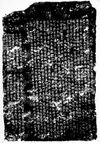
|
1041 | Kundu Township, Ar Horqin Banner Inner Mongolia [ ⚑ ] 43°50′N 121°07′E / 43.83°N 121.12°E |
1975 | Ar Horqin Banner Museum | 27 lines, 783 characters.[15][17][7] |
| Epitaph for the Princess of Yongning Commandery 永寧郡公主 (1033–1091) | 1092 | Wangjiagou Village, Bairin Left Banner Inner Mongolia [ ⚑ ] 44°04′12″N 119°28′30″E / 44.07°N 119.475°E |
2000 | Liao Shangjing Museum | 36 lines, 1,486 characters.[11][7] | |
| Epitaph for Xiao Paolu 蕭袍魯 (1018–1089) | 1090 | Qianshan Village, Faku County Liaoning [ ⚑ ] 42°35′N 123°34′E / 42.58°N 123.56°E |
1965 | Liaoning Provincial Museum | 15 lines, 323 characters.[11] | |
| Epitaph for Xiao Xiaozhong 蕭孝忠 (d.1089) | 1089 | Xigu Mountain, Huludao, Liaoning [ ⚑ ] 40°53′46″N 120°29′53″E / 40.896°N 120.498°E |
1951 | Liaoning Provincial Museum | 18 lines, 540 characters.[15][18] | |
| Epitaph for Yelü Changyun 耶律昌允 (1000–1061) | 1062 | Ta Mountain, Yuanbaoshan District Inner Mongolia [ ⚑ ] 42°05′N 119°06′E / 42.09°N 119.10°E |
2000 | Chifeng City Yuanbaoshan District Office of Cultural Relics | 30 lines, 878 characters.[11][7] | |
| Epitaph for Yelü Qi 耶律褀 or Yelü Asi 耶律阿思 (1033–1108) | 1108 | Tsogt Mountain, Guriban Hushu Gacha, Ar Horqin Banner Inner Mongolia [ ⚑ ] 44°27′N 120°10′E / 44.45°N 120.17°E |
1993 | Institute of Cultural and Historical Relics and Archaeology of the Inner Mongolia Autonomous region | 46 lines, 2,845 characters.[11][7] | |
| Epitaph for Yelü Xinie 耶律習涅 (1063–1114) | 1114 | Xiaohan Mountain, Bairin Left Banner Inner Mongolia [ ⚑ ] 44°36′N 119°21′E / 44.60°N 119.35°E |
1987 | Liao Shangjing Museum | 37 lines, 1,608 characters.[11][7] | |
| Epitaph for Yelü Yanning 耶律延寧 (946–985) | 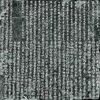
|
986 | Baimu Mountain, Chaoyang County Liaoning [ ⚑ ] 41°38′N 120°12′E / 41.63°N 120.20°E |
1964 | Liaoning Provincial Museum | 19 lines, 271 characters.[15][19] |
| Memorial from the mausoleum of Emperor Taizu of Liao (r.916–926) | 
|
Shifangzi Village, Bairin Left Banner Inner Mongolia [ ⚑ ] 43°53′N 119°08′E / 43.88°N 119.13°E |
1966 and later | Inner Mongolia Museum and Liao Shangjing Museum | Ten fragments from a broken memorial stone, with 78 characters in total.[14][20] | |
| Memorial from the ruins of the Liao capital Shangjing | Lindong Township, Bairin Left Banner Inner Mongolia [ ⚑ ] 43°58′N 119°23′E / 43.96°N 119.39°E |
1965 | Liao Shangjing Museum | Two fragments from a broken memorial stone: A) 10 lines, 64 characters; B) 8 lines, 52 characters.[14][20] | ||
| Monumental stone inscription | 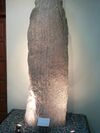
|
1058 | Dornogovi Province Mongolia [ ⚑ ] 44°53′N 110°09′E / 44.88°N 110.15°E |
2010 | National Museum of Mongolian History, Ulan Bator | 7 lines, about 150 characters.[21][22] |
Other inscriptions in the Khitan large script
| Object | Date | Place of discovery | Year of discovery | Current Location | Description |
|---|---|---|---|---|---|
| Rock inscription | Agui Cave, Jarud Banner Inner Mongolia [ ⚑ ] 45°06′N 120°43′E / 45.10°N 120.72°E |
7 Khitan large characters painted on the outside of a cave.[23] | |||
| Two wooden tablets from a Liao dynasty tomb | Daiqin Tala Sumu, Horqin Right Middle Banner Inner Mongolia [ ⚑ ] 45°13′N 121°31′E / 45.22°N 121.52°E |
1999 | Two wooden tablets inscribed with inventories.[24] | ||
| Bronze, silver or gold non-circulation coin | Various examples have been found in different locations. | Four character Khitan inscription on the obverse, interpreted as meaning tiāncháo wànshùn 天朝萬順 in Chinese[25] | |||
| Silver non-circulation coin | Ruins of the Liao capital Shangjing, Lindong Township, Bairin Left Banner Inner Mongolia [ ⚑ ] 43°58′N 119°23′E / 43.96°N 119.39°E |
1977 | Liao Shangjing Museum | Four character Khitan inscription (tiāncháo wànshùn 天朝萬順) on the obverse, with an eight character Khitan inscription scratched onto the reverse[9][26] | |
| Bronze mirror | White Pagoda in the ruins of Qingzhou City, Bairin Right Banner Inner Mongolia [ ⚑ ] 44°12′07″N 118°30′50″E / 44.202°N 118.514°E |
1958 | Inner Mongolia Museum | Five Khitan characters engraved on along the edge of the mirror[26][27] | |
| Bronze Daoist amulet | Acheng District Harbin Heilongjiang [ ⚑ ] 45°33′N 127°00′E / 45.55°N 127.0°E |
Heilongjiang Museum | Daoist charm on one side, and 2 lines (18 characters) of Khitan large script on the other.[28][29] | ||
| Bronze Daoist amulet | Bairin Right Banner Museum | Daoist charm on one side, and 3 lines (28 characters) of Khitan large script on the other.[28][29] | |||
| Silver paiza | Chengde Hebei [ ⚑ ] 41°00′N 117°34′E / 41.00°N 117.56°E |
Institute of East Asian History, Kyoto University | Chinese inscription (天賜成吉思皇帝聖旨疾 "Bestowed by Heaven, the imperial edict of Emperor Chinggis. Urgent.") on one side, and two Khitan large characters meaning "running horse" (Chinese 走馬) on the back.[29] | ||
| Metal tag | Unknown | Unknown | Three Khitan large characters.[30] | ||
| Silver spoon | Wangfugou, Jianping County Liaoning [ ⚑ ] 42°14′N 119°29′E / 42.23°N 119.48°E |
1956 | Liaoning Province Museum | Four Chinese characters (太付太太) followed by five Khitan large characters.[29] | |
| Bronze seal | 1094 | Panshan County Liaoning [ ⚑ ] 41°15′N 122°00′E / 41.25°N 122.00°E |
1986 | Panjin Museum | Seal face inscription is in Chinese ("Seal of the Prince of Qian" 汧王之印), but the upper surface of the seal has two lines of Khitan large characters that have been interpreted as meaning Yixin Ning Dawang 乙辛寧大王 ("Prince Yixinning") and Liao Da'an Shinian 遼大安十年 (10th year of the Liao dynasty Da'an era").[31][32] |
Khitan large script seals
| Object | Image | Place of discovery | Year of discovery | Current Location | Description |
|---|---|---|---|---|---|
| Bronze seal | Naiman Banner Inner Mongolia [ ⚑ ] 42°51′N 120°39′E / 42.85°N 120.65°E |
1957 | Inner Mongolia Museum | Five seal script characters.[33][34] | |
| Bronze seal | Dongtai Village, Ongniud Banner Inner Mongolia [ ⚑ ] 42°57′N 119°03′E / 42.95°N 119.05°E |
1965 | Chifeng Museum | Five seal script characters. The inscription on the face of the seal is repeated on the side as a single column of ordinary Khitan characters engraved in outline.[9][33][35] | |
| Pottery seal | 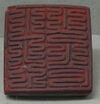
|
Site of the Liao capital Shangjing, Lindong Township, Bairin Left Banner Inner Mongolia [ ⚑ ] 43°58′N 119°23′E / 43.96°N 119.39°E |
1975 | Liao Shangjing Museum, Lindong | [33][36] |
| Bronze seal | Baiyingou, Bairin Left Banner Inner Mongolia [ ⚑ ] 43°55′N 119°33′E / 43.92°N 119.55°E |
1966 | Unknown | [33] | |
| Bronze seal | White Pagoda in the ruins of Qingzhou City, Bairin Right Banner Inner Mongolia [ ⚑ ] 44°12′07″N 118°30′50″E / 44.202°N 118.514°E |
1973 | Chifeng Museum | [33][35] | |
| Bronze seal | Fengcheng Liaoning [ ⚑ ] 40°27′N 124°03′E / 40.45°N 124.05°E |
1964 | Liaoning Province Museum | Five seal script characters.[33][37] | |
| Bronze seal | Jianchang County Liaoning [ ⚑ ] 40°48′N 119°51′E / 40.80°N 119.85°E |
1980 | Liaoning Province Museum | [33][38] | |
| Bronze seal | Guliyingzi, Taonan Jilin [ ⚑ ] 45°21′N 122°48′E / 45.35°N 122.80°E |
1937 | Unknown | [33] | |
| Bronze seal | Unknown | Jilin Museum | [33] | ||
| Bronze octagonal seal | Unknown | Jilin Museum | [33] | ||
| Bronze seal | Weichang County Hebei [ ⚑ ] 41°57′N 117°45′E / 41.95°N 117.75°E |
Inner Mongolia Museum | [33] | ||
| Bronze seal | Unknown | Tianjin Museum | [33] | ||
| Bronze seal | Xayar County Xinjiang [ ⚑ ] 41°15′N 82°48′E / 41.25°N 82.80°E |
1952 | National Museum of China | [33] | |
| Bronze seal | Ili County Xinjiang [ ⚑ ] 43°54′N 81°18′E / 43.90°N 81.30°E |
1958 | National Museum of China | [33] | |
| Bronze seal | Unknown | National Museum of China | Seal script inscription interpreted as meaning "Seal of the Right Vice Commander of the Marshal of the Army" (元帥右都監印).[33] | ||
| Bronze seal | Unknown (impression owned by Luo Fuyi 羅福頤) | Unknown | [30][33] | ||
| Bronze seal | Unknown (impression owned by Luo Fuyi 羅福頤) | Unknown | [30][33] | ||
| Bronze seal | Xiuyan County Liaoning [ ⚑ ] 40°17′N 123°17′E / 40.28°N 123.28°E |
1980 | Xiuyan Museum | Inscription dated 1004 on top of the seal.[33] | |
| Bronze seal | Harqin Left Wing County Liaoning [ ⚑ ] 41°08′N 119°45′E / 41.13°N 119.75°E |
1973 | Harqin Left Wing County Museum | Five seal script characters.[31] |
Monumental inscriptions in the Khitan small script
| Monument | Image | Date | Place of discovery | Year of discovery | Current Location | Description |
|---|---|---|---|---|---|---|
| Epitaph for an unknown person | Haitangshan, Fuxin Liaoning [ ⚑ ] 41°56′06″N 121°51′00″E / 41.935°N 121.850°E |
1991 | Fuxin Museum | 13 lines, 300 characters (the monument is missing the right side, and has been reused for engraving a Buddhist image on its reverse side).[11][39] | ||
| Epitaph for Court Attendant Yelü Yongning 耶律永寧郎君 (1059–1087)[note 2] | 1088 | Beigou, Harqin Banner Inner Mongolia [ ⚑ ] 43°25′01″N 118°19′12″E / 43.417°N 118.320°E |
1995 | Harqin Banner Museum | 43 lines, 1,062 characters.[11][40][7] | |
| Epitaph for Deputy Administrator Yelü 耶律副部署 (Yelü Wumo 耶律兀没, 1031–1077), the brother or nephew of Yelü Qi | 1102 | Tsogt Mountain, Guriban Hushu Gacha, Ar Horqin Banner Inner Mongolia [ ⚑ ] 44°27′N 120°10′E / 44.45°N 120.17°E |
1996 | Inner Mongolia Museum | 51 lines, 2,000 characters.[11][39][7] | |
| Epitaph for Emperor Daozong of Liao 道宗 (1032–1101) | 1101 | Mausoleum of Emperor Daozong, Bairin Right Banner Inner Mongolia [ ⚑ ] 44°22′N 118°30′E / 44.36°N 118.50°E |
1930 | Liaoning Provincial Museum | 37 lines, 1,134 characters; and 6 lines, 36 characters in seal script calligraphy on the lid.[39][41] | |
| Epitaph for Emperor Xingzong of Liao 興宗 (1015–1054) | 1055 | Mausoleum of Emperor Xingzong, Bairin Right Banner Inner Mongolia [ ⚑ ] 44°22′N 118°31′E / 44.36°N 118.51°E |
1922 | Buried in an unknown location at the Imperial Mausoleum. | 36 lines, 861 characters.[23][40][7] | |
| Epitaph for Empress Renyi 仁懿皇后 (?–1076) | 1076 | Mausoleum of Emperor Xingzong, Bairin Right Banner Inner Mongolia [ ⚑ ] 44°22′N 118°31′E / 44.36°N 118.51°E |
1922 | Buried in an unknown location at the Imperial Mausoleum. | 32 lines, 575 characters.[42][43] | |
| Epitaph for Empress Xuanyi 宣懿皇后 (1040–1075) | 
|
1101 | Mausoleum of Emperor Daozong, Bairin Right Banner Inner Mongolia [ ⚑ ] 44°22′N 118°30′E / 44.36°N 118.50°E |
1930 | Liaoning Provincial Museum | 30 lines, 620 characters; and 4 lines, 16 characters in seal script calligraphy on the lid.[40][44] |
| Epitaph for Gu Shizhong (1015–1090) | 1091 | 2009 | Ethnic Museum of Inner Mongolia University | 33 lines, 1,700 characters.[7] | ||
| Epitaph for Madam Han 韓氏, second wife of the imperial son-in-law, Xiao Temei 蕭特每 | 1078 | Unknown | Unknown | 35 lines, 814 characters.[40] | ||
| Epitaph for Madam Yelü 耶律氏 (Yelü Tabuye 耶律挞不也) (1081–1115), the daughter of Yelü Dilie 耶律敵烈 | 1115 | Shanzuizi, Ongniud Banner Inner Mongolia [ ⚑ ] 42°52′05″N 118°58′12″E / 42.868°N 118.970°E |
1962 | Chifeng Museum | 25 lines, 699 characters.[39][45][7] | |
| Epitaph for the Grand Preceptor Shilu 室魯太師 or Salan Shilu Taishi 撒懶室魯太師 | 1100 | Yihebei Village, Jarud Banner Inner Mongolia [ ⚑ ] 44°40′N 121°01′E / 44.67°N 121.02°E |
2000 | Institute of Cultural and Historical Relics and Archaeology of the Inner Mongolia Autonomous region | 15 lines, 150 characters.[11][43][7] | |
| Epitaph for Hudujin Shenmi 胡睹堇審密 or Xiao Hudujin 萧胡睹堇 (1041–1091), the nephew of Xiao Tuguci | 
|
1091 | Khitan Museum, Lindong, Bairin Left Banner, Inner Mongolia | 39 lines, 1,500 characters.[7] | ||
| Epitaph for the Imperial Consort of Song and Wei 宋魏國妃 (1056–1080), the wife of Yelü Hongben | 1110 | Mausoleum of Emperor Xingzong, Bairin Right Banner Inner Mongolia [ ⚑ ] 44°22′N 118°30′E / 44.36°N 118.50°E |
1997 | Bairin Right Banner Museum | 24 lines, 670 characters.[11][43][7] | |
| Epitaph for the Jin Dynasty Defense Commissioner of Bozhou 金代博州防禦使 or the Jin Dynasty Superior General of Zhenguo Circuit 金代鎮國上將軍 (1079–1142) | 1171 | Laohugou Village, Aohan Banner Inner Mongolia [ ⚑ ] 42°06′29″N 119°56′17″E / 42.108°N 119.938°E |
1993 | Aohan Banner Museum | 51 lines, 1,570 characters.[11][46][7] | |
| Epitaph for the Prefect of Zezhou 澤州刺史 (or the Prefect of Zhuozhou 涿州刺史) (?–1107) | 1108 | Nangou Village, Bairin Left Banner Inner Mongolia [ ⚑ ] 44°24′00″N 119°27′54″E / 44.400°N 119.465°E |
1993 | Liao Shangjing Museum | 26 lines, 230 characters. Incomplete inscription because of damage to the stone (top right missing).[11][40][7] | |
| Epitaph for the Prince of Liang 梁國王[note 3] | 1107 | Guan Mountain, Fuxin Liaoning [ ⚑ ] 42°09′25″N 121°57′25″E / 42.157°N 121.957°E |
2001 | [47] | ||
| Epitaph for the Prince of Xu 許王 | 1105 | Wofenggou, Fuxin Liaoning [ ⚑ ] 41°49′12″N 121°36′00″E / 41.820°N 121.600°E |
1977 | Fuxin Cultural Center | 64 lines, 2,163 characters; 1 line, 6 characters.[40][48] | |
| Epitaph for Prince Wotela 斡特剌 (1073–1099), the grandson of Gu Shizhong | 1099 | 2009 | Ethnic Museum of Inner Mongolia University | 22 lines, 1,000 characters.[7] | ||
| Epitaph for Xiao Dilu 蕭敵魯 (1061–1114), the nephew of Xiao Hudujin | 
|
1114 | 2007 | Ethnic Museum of Inner Mongolia University | 26 lines, 520 characters.[7] | |
| Epitaph for Xiao Linggong 蕭令公 (Xiao Fuliu 蕭富留) | 1057 | Xishan Village, Fuxin Liaoning [ ⚑ ] 41°45′50″N 121°22′48″E / 41.764°N 121.380°E |
1950 | Liaoning Provincial Museum | 32 lines, 594 characters.[43][48] | |
| Epitaph for Xiao Taishan 蕭太山 and Princess Yongqing 永清公主 | 2003 | 32 lines, 1,373 characters.[40] | ||||
| Epitaph for Xiao Tuguci 蕭圖古辭 | 1068 | Fuxin Liaoning [ ⚑ ] 42°01′N 121°39′E / 42.01°N 121.65°E |
2000 | 26 lines, 739 characters.[40] | ||
| Epitaph for Xiao Zhonggong 蕭仲恭 | 1150 | Xinglong County Hebei [ ⚑ ] 40°24′N 117°30′E / 40.40°N 117.50°E |
1942 | Hebei Province Office of Cultural Relics | 50 lines, 2,442 characters; 3 lines, 9 characters on the lid.[49][50] | |
| Epitaph for Yelü Jiuli 耶律糺里 or Yelü Gui 耶律貴 (1061–1102)[note 4] | 1102 | Unknown | 2002 (probably robbed from a tomb in the 1990s) | 31 lines, 1,020 characters.[51][7] | ||
| Epitaph for Yelü Cite 耶律慈特 (1043–1081) | 1082 | Baiyinwendu, Ar Horqin Banner Inner Mongolia [ ⚑ ] 43°36′N 120°24′E / 43.60°N 120.40°E |
1997 | Ar Horqin Banner Museum | 30 lines, 930 characters.[11][39][7] | |
| Epitaph for Yelü Dilie 耶律迪烈 (1026–1092) | 
|
1092 | Gahaitu Township, Jarud Banner Inner Mongolia [ ⚑ ] 44°55′N 121°04′E / 44.92°N 121.06°E |
1995 | Liao and Jin City Wall Museum, Beijing | 32 lines, 1,740 characters; 9 lines on the lid.[11][39] |
| Epitaph for Yelü (Han) Dilie 耶律(韓)迪烈 (1034–1100) | 1101 | Baiyinhan Mountain, Baiyinwula, Bairin Left Banner Inner Mongolia [ ⚑ ] 44°22′N 118°53′E / 44.37°N 118.89°E |
1996 | Liao Shangjing Museum | 34 lines, 1,350 characters.[11][39][7] | |
| Epitaph for Yelü Gaoshi 耶律高十 or Han Gaoshi 韓高十 (1015–?) | 1076 c.1076
|
Baiyinhan Mountain, Baiyinwula, Bairin Left Banner Inner Mongolia [ ⚑ ] 44°21′N 118°52′E / 44.35°N 118.87°E |
1995 | Liao Shangjing Museum | 26 lines, 750 characters. Lower half of inscription is missing.[11][39][7] | |
| Epitaph for Yelü Hongben 耶律弘本 (1041–1110), the Imperial Grand Uncle 皇太叔祖 (1041–1110), the son of Emperor Xingzong and Empress Renyi | 1110 | Mausoleum of Emperor Xingzong, Bairin Right Banner Inner Mongolia [ ⚑ ] 44°22′N 118°31′E / 44.36°N 118.52°E |
1997 | Bairin Right Banner Museum | 25 lines, 807 characters; 3 lines, 15 characters in seal script on the lid.[11][43][7] | |
| Epitaph for Yelü Hongbian 耶律弘辨 or Yelü Hongyong 耶律弘用 (1054–1086), the brother-in-law of the Imperial Consort of Song and Wei | 1100 | Orgon Tal, Jarud Banner Inner Mongolia [ ⚑ ] 44°46′41″N 120°43′37″E / 44.778°N 120.727°E |
1996 | Jarud Banner Cultural Relics Office | 32 lines, 900 characters.[11][43][7] | |
| Epitaph for Yelü Jue 耶律玦 (1014–1070) | 1072 | Private museum at Xinhui, Aohan Banner | 46 lines, 2,000 characters.[7] | |||
| Epitaph for Yelü Nu 耶律奴 (1041–1098) | 1099 | Yaoyamen Village, Fuxin Liaoning [ ⚑ ] 41°58′30″N 121°54′00″E / 41.975°N 121.900°E |
1999 | Fuxin Museum | 48 lines, 1,274 characters.[11][43] | |
| Epitaph for Yelü Renxian 耶律仁先 | 1072 | Lianhuashan Village, Beipiao Liaoning [ ⚑ ] 41°52′23″N 121°14′53″E / 41.873°N 121.248°E |
1983 | Liaoning Cultural Relics and Archeology Research Institute | 70 lines, 4,500 characters.[11][43] | |
| Epitaph for Yelü Taishi 耶律太師 (1038–1101), the son of Yelü Xiangwen | 1101 c.1101
|
2009 | Ethnic Museum of Inner Mongolia University | 26 lines, 1,000 characters.[7] | ||
| Epitaph for Yelü Xiangwen 耶律詳穩 (1010–1091), the father of Yelü Taishi | 1091 | 2007 | Ethnic Museum of Inner Mongolia University | 48 lines, 1,600 characters.[7] | ||
| Epitaph for Yelü Zhixian 耶律智先 | 1094 | Lianhuashan Village, Beipiao Liaoning [ ⚑ ] 41°52′23″N 121°15′00″E / 41.873°N 121.250°E |
1998 | Beipiao Museum | 21 lines, 1,000 characters.[11][40] | |
| Epitaph for Yelü Zongjiao 耶律宗教 (992–1053) | 1053 | Gaoqi Village, Beizhen Liaoning [ ⚑ ] 41°32′N 121°41′E / 41.53°N 121.68°E |
1991 | Beizhen Cultural Relics Office | 36 lines, 1,000 characters[11][50] | |
| Jade tablets from the supposed mausoleum of Emperor Jingzong of Liao | Xinli Tomb M2, at Yiwulü Mountain near Futun village, Beizhen Liaoning [ ⚑ ] 41°39′07″N 121°45′43″E / 41.652°N 121.762°E |
2015–2018 | Unknown.[52] | |||
| Record of the Younger Brother of the Emperor of the Great Jin Dynasty (Da Jin huangdi dutong jinglüe Langjun xingji 大金皇弟都統經略郎君行記) | 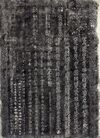
|
1134 | Qianling Mausoleum, Qian County Shaanxi [ ⚑ ] 34°34′30″N 108°13′12″E / 34.575°N 108.220°E |
1618 first recorded in 1618
|
In front of the tomb of Empress Wu of the Tang at Qianling Mausoleum | 5 lines, 97 characters on one side, with corresponding Chinese text on the other side (the only known bilingual Chinese-Khitan text).[43][53] |
| Record of the Younger Brother of the Emperor of the Great Jin Dynasty (incomplete copy) | 1134 | Qianling Mausoleum, Qian County Shaanxi [ ⚑ ] 34°34′30″N 108°13′12″E / 34.575°N 108.220°E |
1982 | Qianling Mausoleum Museum | A copy of the text of the memorial in front of the tomb of Empress Wu, recovered from the ruins of a sacrificial hall at the Qianling Mausoleum, but only one quarter of text remaining.[53] |
Other inscriptions in the Khitan small script
| Object | Image | Date | Place of discovery | Year of discovery | Current Location | Description |
|---|---|---|---|---|---|---|
| Bronze octagonal mirror owned by Wanyan Tong 完顏通 | 1140–1189 | Da'an Jilin [ ⚑ ] 45°30′N 124°18′E / 45.50°N 124.30°E |
1971 | Jilin Provincial Museum | 5 lines, 16 characters.[54] | |
| Bronze octagonal mirror | 
|
Inner Mongolia Museum | 4 Khitan characters on the reverse, and three Chinese characters (寶坻) along the edge.[55] | |||
| Bronze mirror | 
|
Kaesŏng North Korea [ ⚑ ] 37°58′N 126°33′E / 37.96°N 126.55°E |
1912 pre-1912
|
National Museum of Korea, Seoul | Khitan poem comprising 7 lines, 28 characters.[56] | |
| "Shouchang" non-circulation lucky coin | 4 characters on the reverse, interpreted as meaning 壽昌.[55] | |||||
| Fish-shaped bronze tally | 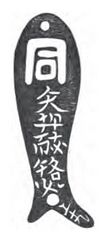
|
Originally in the collection of Stephen Wootton Bushell (1844-1908); current whereabouts unknown. | Chinese character tóng 同, with one line of Khitan small characters.[55] | |||
| Fish-shaped bronze tally | Chinese character tóng 同, with two lines of Khitan small characters.[55] | |||||
| Jade cup | 2 lines, 11 Khitan small characters on bottom of the cup.[57] | |||||
| Yellow-glazed ceramic brush washer | [55] | |||||
| Inscriptions on a pagoda | White Pagoda, Hohhot Inner Mongolia [ ⚑ ] 40°50′N 111°54′E / 40.84°N 111.90°E |
[58] | ||||
| Inscriptions on the walls of a cave | Balahada Cave (巴拉哈達洞), Horqin Right Middle Banner Inner Mongolia |
[59] | ||||
| Inscriptions on a Liao dynasty tomb mural | Bao Mountain, Ar Horqin Banner Inner Mongolia [ ⚑ ] 44°04′23″N 119°39′58″E / 44.073°N 119.666°E |
1996 | Short inscription on a mural.[58] | |||
| Inscriptions on a painted wooden coffin | Ongniud Banner Inner Mongolia [ ⚑ ] 42°56′N 119°02′E / 42.93°N 119.03°E |
Juu Uda League Cultural Relics Station | 22 characters on the colour painting of a wooden coffin.[56] | |||
| Inscriptions at the Liao imperial mausoleum | Bairin Right Banner Inner Mongolia [ ⚑ ] 44°22′N 118°30′E / 44.36°N 118.50°E |
About 50 Khitan small character captions on murals at the east tomb.[56] |
Khitan small script seals
| Object | Date | Place of discovery | Year of discovery | Current Location | Description |
|---|---|---|---|---|---|
| Bronze seal | Gaizhou Liaoning [ ⚑ ] 40°24′N 122°22′E / 40.40°N 122.36°E |
1972 | Liaoning Province Museum | Seal script form Khitan small characters.[33][37] |
See also
- List of Jurchen inscriptions
- Nova N 176, an undeciphered manuscript codex written in the Khitan large script
Notes
- ↑ This monument was previously known as the Yingli period monument (Yingli bei 應歷碑), but the characters that were originally interpreted as meaning the Yingli 應歷 period (951–969) are now interpreted as meaning the Dading 大定 period (1161–1189), so what was once thought to be the earliest Khitan memorial in now thought to be the latest in date.[13]
- ↑ Kane 2009 lists Khitan small script memorials for both Lord Yelü Yongning and a Lord Yelü, but the latter is not recorded in any other sources, and appears to be a synonym for the former.
- ↑ The memorials for the Prince of Liang and his wife, the Imperial Consort of the State of Liang (梁國太妃), were found together, and although the memorial for the Imperial Consort is in Chinese, Kane 2009 incorrectly lists it as being in the Khitan small script.
- ↑ The name of the official commemorated by this inscriptions has been variously given as Yelü Guiyexi 耶律貴也稀, Yelü Gui 耶律貴, Yelü Diligu 耶律迪里姑, Yelü Gui-Diligu 耶律貴·迪里姑 and Yelü Yiliyan 耶律夷里衍.
Footnotes
- ↑ Kane 2009, p. 4
- ↑ Kane 2009, pp. 169–170
- ↑ Kane 2009, p. ix
- ↑ Kane 2009, p. 4
- ↑ Kane 2009, p. 1
- ↑ Kane 2009, p. 2
- ↑ 7.00 7.01 7.02 7.03 7.04 7.05 7.06 7.07 7.08 7.09 7.10 7.11 7.12 7.13 7.14 7.15 7.16 7.17 7.18 7.19 7.20 7.21 7.22 7.23 7.24 7.25 7.26 7.27 7.28 Wu Yingzhe 2012
- ↑ Sun Bojun 孫伯君 (2006). (in Chinese)Shije Minzu 世界民族 (4): 44–52. ISSN 1006-8287. http://www.docin.com/p-63761660.html.
- ↑ 9.0 9.1 9.2 Liu Fengzhu & Yu Baolin 1990, p. 392
- ↑ Yu Baolin 1985, p. 200
- ↑ 11.00 11.01 11.02 11.03 11.04 11.05 11.06 11.07 11.08 11.09 11.10 11.11 11.12 11.13 11.14 11.15 11.16 11.17 11.18 11.19 11.20 11.21 11.22 Liu Pujiang 2003
- ↑ Cong Yanshuang 叢艷雙; Liu Fengzhu 劉鳳翥; Chi Jianxue 池建學 (2005). (in Chinese)Minzu Yuwen 民族語文 (4): 50–55. ISSN 0257-5779.
- ↑ Li Junyi 李俊義 (2009-09-26). "Error: no
|title=specified when using {{Cite web}}" (in Chinese). http://hi.baidu.com/%BE%B2%D0%E9%C9%BD%B7%BF%D6%F7%C8%CB/blog/item/0b110e00e43bde09728da52f.html. Retrieved 2010-12-22. - ↑ 14.0 14.1 14.2 Yu Baolin 1985, p. 202
- ↑ 15.0 15.1 15.2 15.3 Liu Fengzhu & Yu Baolin 1990, p. 391
- ↑ Yu Baolin 1985, pp. 200–201
- ↑ Yu Baolin 1985, pp. 202–203
- ↑ Yu Baolin 1985, p. 201
- ↑ Yu Baolin 1985, pp. 201–202
- ↑ 20.0 20.1 Liu Fengzhu & Yu Baolin 1990, p. 390
- ↑ "Old manuscripts, sculpture found". http://mobile.news.mn/mcontent/26056.shtml?s=english. Retrieved 2011-10-11.
- ↑ "New Trends in the Studies on Qidan Scripts". Research Institute for Languages and Cultures of Asia and Africa, Tokyo University of Foreign Studies. http://www.aa.tufs.ac.jp/en/projects/jrp/jrp174. Retrieved 2011-10-11.
- ↑ 23.0 23.1 Yu Baolin 1985, p. 205
- ↑ Liu Fengzhu 劉鳳翥; Ding Yong 丁勇; Kong Qun 孔群; Bai Yu 白玉 (2006). (in Chinese)Minzu Yuwen 民族語文 (5): 62–66. ISSN 0257-5779.
- ↑ Sun Jimin 孫繼民 (1994). "內蒙古剋什剋騰旗發現契丹大字金銀錢". Kaogu 考古 (2): 179. ISSN 0453-2899.
- ↑ 26.0 26.1 Yu Baolin 1985, p. 203
- ↑ Liu Fengzhu & Yu Baolin 1990
- ↑ 28.0 28.1 Liu Fengzhu & Yu Baolin 1990, pp. 391–392
- ↑ 29.0 29.1 29.2 29.3 Yu Baolin 1985, p. 204
- ↑ 30.0 30.1 30.2 Jin Yufu 1934
- ↑ 31.0 31.1 Li Yufeng 李宇峰 (1990). "遼寧盤山縣發現遼契丹大字銅印". Kaogu 考古 (12): 1143. ISSN 0453-2899.
- ↑ "Error: no
|title=specified when using {{Cite web}}" (in Chinese). http://www.gscn.com.cn/Get/wenhua/06111014122039084_96.htm. Retrieved 2010-12-15. - ↑ 33.00 33.01 33.02 33.03 33.04 33.05 33.06 33.07 33.08 33.09 33.10 33.11 33.12 33.13 33.14 33.15 33.16 33.17 33.18 Yu Baolin 1985, pp. 203–204
- ↑ Li Yiyou 李逸友 (1961). "內蒙古出土古代官印的新資料". Wenwu 文物 (9): 64–65. ISSN 0511-4772.
- ↑ 35.0 35.1 Xiang Chunsong 項春松 (1983). "內蒙古昭烏達盟發現的一批古印資料". Wenwu 文物 (8): 76–82. ISSN 0511-4772.
- ↑ "#36834: Liao AE seal, Qidan seal script". Zeno Oriental Coins Database. http://www.zeno.ru/showphoto.php?photo=36834. Retrieved 2010-12-15.
- ↑ 37.0 37.1 Wu Jiachang 武家昌 (1984). "遼寧近年出土、徵集的宋遼金官印選輯". Wenwu 文物 (9): 83–84. ISSN 0511-4772.
- ↑ Feng Yongqian 馮永謙; Deng Baoxue 鄧寶學 (1983). "遼寧建昌普查中發現的重要文物". Wenwu 文物 (9): 66–72. ISSN 0511-4772.
- ↑ 39.0 39.1 39.2 39.3 39.4 39.5 39.6 39.7 Kane 2009, p. 9
- ↑ 40.0 40.1 40.2 40.3 40.4 40.5 40.6 40.7 40.8 Kane 2009, p. 11
- ↑ Yu Baolin 1985, p. 206
- ↑ Yu Baolin 1985, pp. 205–206
- ↑ 43.0 43.1 43.2 43.3 43.4 43.5 43.6 43.7 43.8 Kane 2009, p. 10
- ↑ Yu Baolin 1985, pp. 206–207
- ↑ Yu Baolin 1985, pp. 207–208
- ↑ Kane 2009, pp. 8–9
- ↑ Han Shiming 韩世明; Yoshimoto Chieko 吉本智慧子 (Aisin-Gioro Ulhicun) (2007). "梁國王墓誌銘文初釋". Minzu Yanjiu 民族研究 (2). ISSN 0256-1891.
- ↑ 48.0 48.1 Yu Baolin 1985, p. 207
- ↑ Yu Baolin 1985, pp. 208–209
- ↑ 50.0 50.1 Kane 2009, p. 12
- ↑ Liu Pujiang 劉浦江 (2009). (in Chinese)Beida Shixue 北大史學 (14). Archived from the original on 7 July 2011. https://web.archive.org/web/20110707025108/http://www.zggds.pku.edu.cn/004/001/175.pdf.
- ↑ "Significant achievements of Mausoleum archaeology from Liao Dynasty in Yiwulu Mountain". 31 October 2018. http://kaogu.cssn.cn/ywb/news/new_discoveries_1/201810/t20181031_4767419.shtml. Retrieved 23 November 2011.
- ↑ 53.0 53.1 Yu Baolin 1985, pp. 208
- ↑ Yu Baolin 1985, pp. 209–210
- ↑ 55.0 55.1 55.2 55.3 55.4 Yu Baolin 1985, pp. 210
- ↑ 56.0 56.1 56.2 Yu Baolin 1985, pp. 209
- ↑ Yu Baolin 1985, pp. 210–211
- ↑ 58.0 58.1 Yu Baolin 1985, pp. 211
- ↑ Chinggeltei 1985, p. 625
References
- Chinggeltei 清格爾泰; Wu Yingzhe 吴英哲; Liu Fengzhu 劉鳳翥; Chen Naixiong 陳乃雄; Yu Baolin 于寶林; Xing Fuli 邢復禮 (1985), 契丹小字研究, Zhongguo Shehui Kexue Chubanshe
- Jin Yufu 金毓黻, ed. (1934) (in Chinese), 5, Fengtian Library
- Kane, Daniel (2009), The Kitan Language and Script, Brill, ISBN 978-90-04-16829-9, https://books.google.com/books?id=BnsZjpIa-cYC
- Liu Fengzhu 劉鳳翥; Yu Baolin 于寶林 (1990), "契丹字", in Fu Maoli 傅懋栗 (in Chinese), Zhongguo Shehui Kexue Chubanshe, pp. 247–395, ISBN 978-7-5004-0296-1
- Liu Pujiang 劉浦江 (2003), (in Chinese)Wenxian 文獻 (3), ISSN 1000-0437, http://www.zggds.pku.edu.cn/005/003/004.htm
- Yu Baolin 于寶林 (1985), (in Chinese)Wenxian 文獻 (1): 198–224, ISSN 1000-0437
- Wu Yingzhe 吴英哲 (23 March 2012), Organization of the Khitan Materials Kept in Inner Mongolia
External links
 |
 KSF
KSF